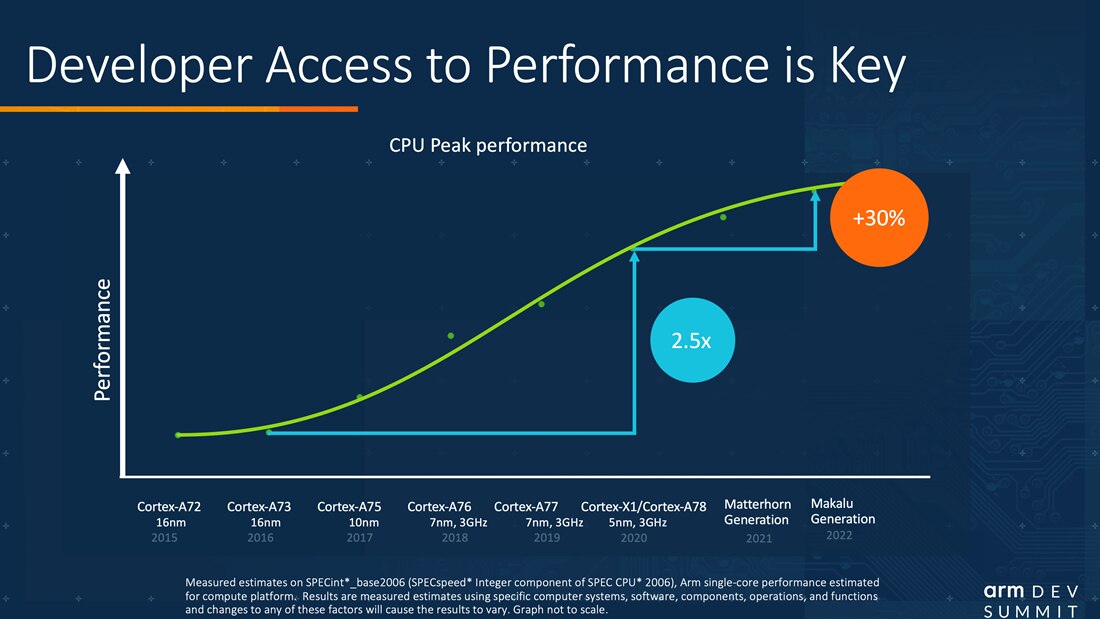Pushing the Boundaries of Performance and Security to Unleash the Power of 64-bit Computing

By Paul Williamson, vice president and general manager, Client Line of Business
News highlights:
- Arm highlights its next two generations of CPUs, codenamed Matterhorn and Makalu, with up to a 30% performance uplift
- Starting with Arm’s 2022 IP, all future Cortex-A “big” cores will only support 64-bit
- Arm’s updated Client roadmap delivers a Total Compute approach with an emphasis on performance, security, and developer access
Over the last year, I have been inspired by the innovators who are dreaming up solutions to improve and enrich our daily lives. Tomorrow’s mobile applications will be even more imaginative, immersive, and intelligent. To that point, the industry has come such a long way in making this happen. Take app stores for instance – we had the choice of roughly 500 apps when smartphones first began shipping in volume in 2007 and today there are 8.9 million apps available to choose from.
Mobile has transformed from a simple utility to the most powerful, pervasive device we engage with daily, much like Arm-based chips have progressed to more powerful but still energy-efficient SoCs. Although the chip-level innovation has already evolved significantly, more is still required as use cases become more complex, with more AI and ML workloads being processed locally on our devices.
A transformative approach to SoC design
To meet the demands of this new reality, we’re evolving our design methodology to go beyond raw CPU performance and take a more holistic approach that impacts system design based on real-world use-case analysis.
To help creators deliver next-generation user experiences, we unveiled our new Total Compute strategy this time last year. We believe that breakthrough performance is achieved through transcending the boundaries of cores and technologies and thinking about the entire system as an organic whole.
This is why we built Total Compute around three key principles: increasing compute performance of the system, better developer access to that performance through our software and tools, and security protection throughout the ecosystem. Each of these pillars is essential to our vision for the future of compute, one that expands the developer’s world with new capabilities to unlock innovation and enable the highest levels of creativity.
The future of faster, more advanced mobile experiences is 64-bit
If developers are to create new, complex digital immersion experiences that consumers are demanding, apps need to continue to move to 64-bit. The 64-bit instruction set provides the performance improvements and compute capabilities in the hardware to make these experiences faster and more responsive, while meeting the demands of new compute-intensive workloads from future AI, XR (AR and VR) and high-fidelity mobile gaming experiences.
But it’s not just hardware improvements, by moving to 64-bit, developers can also gain from performance improvements in their code for example, recompiling on 64-bit gives a definite performance benefit over 32-bit. This, along with additional security, is leading more and more developers to focus on apps suitable for the 64-bit only mobile devices expected to arrive by 2023. Additionally, since app developers will now only have to focus on one set of binaries, the transition to 64-bit will help in savings on cost and time-to-market. It’s for these reasons, starting with Arm’s 2022 IP, all future “big” cores will only support 64-bit code.
Pushing performance and security further
Over the last few years our CPU performance has grown by 2.5x from Cortex-A73 to today’s Cortex-A78 generation, and we are continuing to push this performance further. As we look towards future Total Compute solutions, I’m pleased to preview what is coming in our next two Client CPUs, codenamed Matterhorn and Makalu, which will provide a performance uplift of up to 30% from the current Cortex-A78 to the future Makalu generations.

As I mentioned earlier, security is a key pillar of our Total Compute approach and is fundamental to build trust in future applications, services, and devices. In our first generation of Total Compute, and our Matterhorn generation CPUs, we are introducing a new security feature called Memory Tagging Extension (MTE) to tighten security vulnerabilities that can occur in memory subsystems. MTE will make detecting memory safety violations easier and more efficient for every software developer in the ecosystem.
Engineering a new reality
Looking ahead, the future will see yet more remarkable innovation within the tech industry and Arm’s role is to create the technology blueprint that gives innovators the freedom to create new realities on mobile and beyond.
Consider the incredibly innovative Arm ecosystem with Niantic and MojoVision, two disruptive forces that have changed the way we think about technology’s impact on our lives. Niantic continue to create compelling AR experiences that are pushing the requirements of the hardware performance on every device and creating a new community of AR gamers. While away from mobile, MojoVision has created a disruptive technology called ‘The Mojo Lens’ that projects real-time data directly onto a person’s field of vision through a contact lens.
Looking ahead, I can’t wait to see the future innovations that arise when these new technological capabilities are fused with the creativity of developers.
Any re-use permitted for informational and non-commercial or personal use only.












